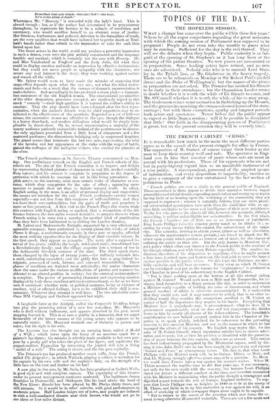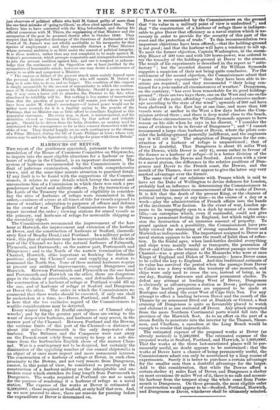THE FRENCII CABINET "CRISIS."
IT is remarkable how much in the main the most different parties agree as to the morak of the present struggle for office in krance. The supporters of M. Guizot of course vaunt their leader as the man to keep their country well and safe. The spectator in En- land sees in him that asserter of peace whose acts are most in accord with his professions. Those of his opponents who are not lost in party-bigotry regard him as an unsuitable instrument of a wise policy. A correspondent, possessed of the amplest means of information, and every disposition to impartiality, enables us to give a summary- of the view entertained by the last section of politicians in Paris. " French politics are ever a riddle to the general public of England. Those concerned in them appear to divide their attention between vague generalities and trivial details, expending much talent and energy upon topics haviug little or no bearing upon the welldoing of the community they are supposed to represent : whence it naturally follows, that our more practi- cal sober-minded countrymen turn aside from the exhibition with an opi- nion little creditable to the sense and intelligence of their next neighbours. To the few who possess the clue to all this, however, the spectacle, although uninviting, is neither unintellieible nor uninstructive. In the first place, the French Chambers are of little use as an instrument of legislation. King Louis Philippe rules his country pretty much as he thinks lit ; se- curing, by every means within his control, the subserviency of the majo- rity. The minority, desiring to obtain power, (there as well as elsewhere, wherever the representative system prevails,) arc forced to attack the-Mi- nister upon points which possess al interest out of-doors, for the chance of enlisting the public on their side. But the only feature in Monsieur Gui- zot's policy which offers any interest to the French public is the conduct of his foreign relations, and with Great Britain especially. The smallest in- dication, therefore, of his disposition to conciliate, when he might assume a firm tone, is seized upon and beaten out, like leaf-gold, to cover the largest surface possible in the public vision. On this topic the Parisians are mor- bidly excitable, and will hear no reason. Every scrap on which M. Guizot can be catechized and put to the torture for explanations' is produced in the Chamber in proof of his subserviency to the English Cabinet. just observers of political affairs who hold M. Guizot guilty of more than the one fatal mistake of 'going to Ghent,' so often cited against him. They believe him to have concerted with the King beforehand, and during his official connexion with M. Thiers, the supplanting of that Minister and the occupation of the post he assumed shortly after in October 1840. They suspect that his imperfect discharge of the functions of Ambassador at the Court of St. James's was not wholly ascribable to his incapacity for that species of employment ; and they naturally distrust a Prime Minister -whose personal ambition is so little under the control of political integrity. It is these motives, rather than any real complaint to be made against M. Gaiters government, which prompts respectable and distinguished members to join the present coalition against him: and one is tempted to acknow- ledge that the sentiments of the Opposition are st least justified by the sympathies of honourable minds, however one may desire a continuance of power to so able and competent a Minister.
"The success or failure of the present attack must mainly depend upon the personal decision of Louis Philippe; who will sustain M. Guizot as long as it suits him to do so, and no longer. The condition of this support is simply measurable by the amount of unpopularity to which the continu- ance of M. Guizot's Ministry exposes his Majesty. Should it go on increas- ing, it may seem a lesser evil to abandon the Premier to his fate, when abandoned he infallibly will be. But nothing is less matter of uncertainty than that the question of peace or war will remain just where it would have been under M. Guizot's ascendancy—if indeed peace would not be rather more assured; for it is a familiar saying in the mouths of the Parisians, that no Minister can so little afford to conciliate England as this unpopular statesman. His every step, in short, is misinterpreted, and his discretion viewed as 'treason to France,' by that ardent and irritable people. Should he be driven from the helm, therefore, no anxiety need be entertained for the consequences so far as they connect themselves with the risks of war. They depend happily on no such contingency as the change of a Prime Minister, during the life of Louis Philippe at least; whose very crown may be said to be, figuratively, in pledge for peace with Great Britain."



























 Previous page
Previous page